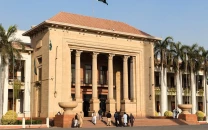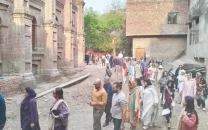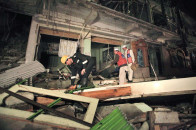Forests workshop: Trees in south Punjab felled at ‘alarming rate’
UN-funded project to conserve forests being introduced in Pakistan.

The WWF-Pakistan has already hosted workshops in AJK and KPK and plans to hold them in in Gilgit Baltistan, Sindh and Balochistan next. PHOTO: WWF
The riverine forests in southern Punjab are being chopped down at an “alarmingly fast rate”, according to a recent survey by the World Wide Fund for Nature-Pakistan (WWF-P).
“In Punjab, there are three forest types – the pine forests of Murree, the scrubs of the Salt Range and the riverine forests near Kot Addu, Vehari and Muzaffargarh,” said Ibrahim Khan, the WWF-P senior manager for conservation in Khyber Pakhtunkhwa, at a workshop here on Monday.
The riverine forests, mainly along the River Indus in south Punjab, are being chopped down at an alarmingly fast rate compared to other natural forests in the Punjab, Khan said.
In the recent survey, residents near forests in 10 districts – two each in the Punjab, Sindh, Khyber-Pakhtunkhwa and Balochistan, and one each in Gilgit-Baltistan and Azad Jammu and Kashmir – were interviewed to find out why trees were being chopped down.
“Deforestation is far more complex and pervasive in Gilgit Baltistan, Azad Jammu Kashmir and Khyber Pakhtunkhwa than Balochistan, Sindh and the Punjab,” said Khan. This was because in the former areas, people were more dependent on the forests for their livelihoods and the timber mafias were stronger.
The survey was conducted as part of the REDD+ (Reducing Emissions from Deforestation and Degradation) project, funded by the United Nations. The two-day workshop aims to educate stakeholders on how REDD can bring positive change in forested areas.
The workshop organised by the Ministry of Climate Change, the UN and the International Centre for Integrated Mountain Development (ICIMOD), was attended by officials from the Forest, Wildlife and Fisheries, the Livestock and Agriculture, and the Environment Protection Departments, as well as students and professors from the University of Agriculture Faisalabad, the Government College University Lahore and the University of the Punjab.
The challenge is to convince stakeholders to agree and cooperate in implementing projects to combat deforestation and degradation, Khan said.
The workshop, inaugurated by Wildlife Secretary Dr Amir Ahmad, began with an overview of forests in the Punjab and was followed by an introduction to REDD and its roadmap development process for Pakistan.
The REDD project aims to create financial value for the carbon stored in forests by offering incentives for developing countries to reduce emissions from forested lands and by investing in low-carbon paths to sustainable development. So far the WWF-P has received $200,000 (Rs20 million) in funding from the UN and will receive another $100,000 (Rs10 million) in June.
Faiza Lodhi, the REDD+ coordinator for WWF-P, said a roadmap for Pakistan will be finalised by December 2013, after which implementation will begin. The project is more advanced in Nepal than in the rest of South Asia. A demonstration site has been set up in Godawari, a hilly village in northern Nepal where locals are being taught ways to conserve water for fish farming, to make briquettes for fuel using hay or sand with coal to reduce dependency on forest wood, and to plant kiwi trees to earn extra money. All these activities help reduce the need for chopping down trees, Lodhi said.
Nepal has increased its forest cover in the last three years, going up to 25.36 per cent, according to a 2012 World Bank report. India, Bangladesh and Pakistan are still in the preparation phases for REDD initiatives, Lodhi said.
The WWF-Pakistan has already hosted workshops in AJK and KPK and plans to hold them in in Gilgit Baltistan, Sindh and Balochistan next.
Published in The Express Tribune, April 30th, 2013.



















COMMENTS
Comments are moderated and generally will be posted if they are on-topic and not abusive.
For more information, please see our Comments FAQ